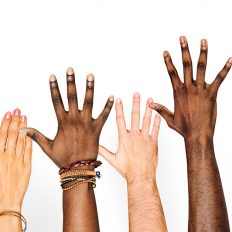June is National PRIDE Month, where celebrations across the United States are held in honor of the Stonewall Uprising in 1969. We sat down with our Business Solutions Partner, Patrick Martin, to discuss his own journey in the LGBTQ+ community and the ways we can strive to do more to support everyone within the workplace.
Q: Coming into PRIDE month, there are a spectrum of emotions (celebration, joy, remembrance, loss, struggle, etc). Knowing that, why do you think it’s so important to take part in PRIDE month?
PATRICK: This month is about celebration. It’s important to embrace diversity, of all different kinds. It’s a month where we focus on building awareness towards how we talk about some of the issues. It’s a positive thing – we can have these open conversations to shed light on something that’s been in the shadows for so long and not feel afraid.
I came out later in life, only about a year ago. While I was in the closet, it took SO much effort to hide who I was and how I was feeling. For instance, to protect my identity, I used to listen to sports radio on the way to work, and I’m not even really a sports fan but I felt I needed to be perceived as straight so I believed the stereotype that “[straight] men like sports” so I better know the scores if I want to fit in. Now that I’m open with who I am, it allows me to be more present instead of wasting energy trying to be something I’m not. Now I listen to business podcasts on the way to work and spend more energy on things that might actually help my career. By being more authentic, the weight of trying to hide who you truly are is taken off your shoulders and creates more room for the other things in your life.
Q: What can organizations do to help and support the current and next generation in the community?
PATRICK: Just being more accepting and aware, and understanding the unconscious bias towards one thing or another.
Just as a scenario, imagine you’re a right-handed person, but in your company, right-handed people don’t get promoted as easily or they don’t get assigned the best projects. People don’t feel comfortable working with right-handed people. So as a right-handed person that’s just trying to put food on the table for your family, you need to show up to work and PRETEND your left-handed. Every time you grab a pen, you need to be conscious of how you hold it. Every time you go to open a door, you need to think about how you open it, because if you slip up, someone might notice you’re right-handed. Just imagine all that wasted energy you have to use to protect yourself in the workplace for something that really doesn’t matter.
Now imagine a workplace that is totally inclusive of right-handed AND left-handed people. How much more productive those teams can be when they don’t need to even think about it. How much faster they can get things done. Where would you rather work?
Q: Do you think there are any misconceptions about DE&I and the LGBTQ+ community? Ways we can do better?
PATRICK: We can be better by just meeting people where they are as people. It’s a sign of respect to greet someone by their name or lean into their pronouns and not to assume everything about someone. We may not get it right the first time and it’s uncomfortable. But to not be considerate of it takes a strike to the ego and that uncomfortable feeling lasts even longer for the person not being recognized for who they are and instead by what is assumed. Sometimes people can be hurtful without having hurtful intent and this is one of the ways that happens.
Q: Cramer is family owned and operated. Can you walk us through what that experience was like of coming out to both, since they are so closely connected?
PATRICK: (laughs) Ok for the record how I came out at work is a great example of how NOT to do it! I wasn’t sure what to do at first so when I finally decided to be open about it, I called Christine [head of HR] and told her I had something very important to talk with her about. She was very accepting, and I asked her if I need to like send out an email or hold a company meeting (laughs) I just didn’t know! She made me feel super comfortable and reassured me that I didn’t need to do ANY of that! She expressed how happy she was for me and that the company had my back 1000%. I had never seen how others navigate this and she told me, while she appreciated me telling her, it was up to me who I wanted to tell and how, I didn’t HAVE to do a big announcement or anything.
So work was a little easier. With my family and friends, I had more of one-on-one conversations. And some people weren’t entirely on board right away. But I think it was because they just didn’t understand and were trying to protect me. Now that they see how much happier I am, it makes more sense. People being able to choose their own lives is so important and my new normal is being able to live more true to who I am – now it’s my secret superpower.
Q: Would you say since going on your own journey, what your “new normal” is or how it’s changed? How do you feel about it?
PATRICK: Oh absolutely! My new normal is amazing – even better that I thought it would be. Something as simple as just wearing what I want to wear. Like if I think a pair of shoes or colorful shirt is cool, I don’t have to overthink it or worry how people are going to perceive it because of a certain color or style. I think most people may take that for granted. I know I have a certain level of privilege even within the community because I present as straight. So, I could assimilate, but there are those whose mannerisms or speech patterns will be perceived as that and they may not even be gay! I feel relieved that I get to be who I am and live my truth, but I have more awareness now how these biases still affect so many others.
Q: What would you tell people who themselves are on their own journey of self-acceptance and understanding?
PATRICK: What I would want people to know, especially if they are LGBTQ+ and still in the closet, is they’re not broken. Perceptions from society are. I wish I had known that because I struggled with that the most; thinking there was something wrong with me. But in current times, we are finding more opportunities to embrace what makes us unique. Realizing that, coming out became easier. Like I said, being the authentic version of myself is so much better than I imagined, and others should be able to be who they are too.



